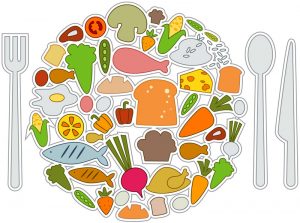Research increasingly looks to overall dietary pattern, rather than any single nutrient, phytochemical or even food, to reduce cancer risk. How appropriate, therefore, that the closing session of the 2014 AICR Research Conference focused on the latest research on several popular dietary patterns.
The New Nordic Diet originated in Denmark to create a healthy eating pattern that suits the foods and flavor palate of Scandinavian countries. The diet’s heavy on fish, cruciferous and root vegetables (like cabbage and carrots) and oatmeal; it’s lighter on pork and other red meats. You’ve probably heard about a Mediterranean dietary pattern’s association with lower risk heart disease and other health benefits, but some featured foods are not universally accessible or familiar.
At the conference, Thomas Meinert Larsen, PhD, showed results of studies in which intensive half-year programs of people following the New Nordic Diet brought improvements in heart health risks and weight loss. This shows potential to reduce cancer risk, with eating changes that participants actually enjoyed.
Want to try? You can read more about the foods of the New Nordic Diet on my Smart Bytes® blog. Research will continue working to identify the most important elements of a cancer-protective diet. For now, include a wide variety of vegetables, fruits, whole grains, beans and nuts, seasoned with herbs and spices you enjoy, as the focus of your eating habits.
Intermittent Diets have become popular in bookstores, magazines and websites, primarily targeting weight loss. Often called “5:2 Diets”, the basic pattern consists of five days of standard healthy eating and two days of sharply decreased calorie consumption each week. The goal of developing this eating pattern was to help women lose the excess weight that puts them at increased risk of breast cancer (and others), said Michelle Harvie, PhD, a British research dietitian who originated the concept.
On calorie-restricted days, the women in Harvie’s studies consume about 650 calories. The other five days are not “anything goes” feasts, but basic healthy eating that totals about 1900 calories a day.
Human trials so far show weight loss comparable to that seen with continuous calorie restriction, with no greater loss of lean muscle and about a 25 percent reduction in insulin levels. And in one study, Harvie found that it didn’t matter if the energy restriction was having fewer carbs or protein.
Want to try? If you are taking medicine for diabetes or have other medical conditions, discuss this diet with your physician before proceeding. For others, if you want to try two days a week with deeply reduced calories, make sure that you keep hydrated on those days and hold onto the other days as days for healthful eating. If you find yourself rebounding on those days into overeating, this approach may not be right for you.
Anti-Inflammatory Diets are also top sellers in books and elsewhere. Chronic inflammation seems part of the foundation promoting development of cancer and other chronic diseases. In animal and human studies, a wide range of nutrients, phytochemicals, foods and even spices reduce markers of inflammation. However, since we don’t eat nutrients or foods in isolation, but combined with others, it’s important to see whether eating choices that are theoretically “anti-inflammatory” really come together showing reduced inflammation.
That’s the goal of the research-derived dietary inflammatory index, said Susan Steck, PhD, MPH, RD. This index includes 45 different dietary factors that show links with C-reactive protein (CRP) and other markers of inflammation. An analysis from the Iowa Women’s Health Study, found that women who consumed the most pro-inflammatory diets were at 20 percent greater risk of colorectal cancer than women with more anti-inflammatory diets. Here’s an earlier post on the study.
Want to try? More anti-inflammatory diets are typically high in fiber, spices, healthy fats and green leafy vegetables. In a video interview on my Smart Bytes® blog, Steck notes that there are multiple ways to create an anti-inflammatory eating pattern.
This year’s AICR Research Conference showed that we are not nearly done identifying different ways of creating cancer-fighting eating patterns. For more on how dietary patterns can promote lower cancer risk, Sharon Palmer, RD, and I did a webinar for health professionals on this topic.
Karen Collins, MS, RDN, CDN, FAND, is AICR’s Nutrition Advisor. Karen is a speaker, writer and consultant who specializes in helping people make sense of nutrition news. You can follow her blog, Smart Bytes®, through her website and follower her on Twitter as @KarenCollinsRD.





